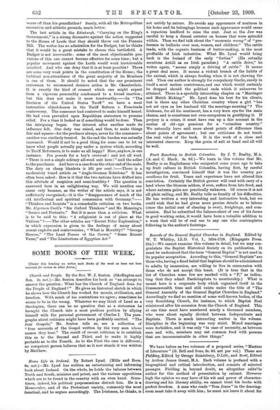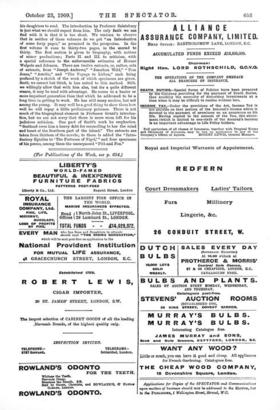We have before us two volumes of a proposed series,
"Masters of Literature" (G. Bell and Sons, 3s. 6d. net per voL) These are Fielding, Edited by George Saintsbury, D.Litt., and Scott, Edited by Arthur James Grant, MA. Each volume is prefaced with a biographical and critical introduction, and consists of selected passages. Fielding is, beyond doubt., an altogether suitele author for this method of presentation by extract. However high the opinion we may have of his wit and power of character- drawing and his literary ability, we cannot treat his books with perfect freedom. A man who reads "Tom Jones" in the drawing- room must take it away with him; he must not leave it about for his daughters to read. The introduction by Professor Saintsbury is just what we should expect from him. The only fault we can find with it is that it is too short. We venture to observe that in neither of these volumes do we get "an Introduction of some forty pages," as promised in the prospectus. In the first volume it runs to thirty-two pages, in the second to thirty. The first section is given to biography, with notices of minor productions ; Parts II. and III. to criticism, with a special reference to the -unfavourable estimates of Horace Walpole and Johnson. There are twelve extracts, or, rather, sets of extracts, from "Joseph Andrews," "Jonathan Wild," "Tom Jones," "Amelia," and "The Voyage to Lisbon," each being prefaced by a sketch of the work of which specimens are given. Scott, we cannot but think, is less suited to this method. Still, we willingly allow that with him also, but for a quite different reason, it may be used with advantage. He seems to a busier or more impatient generation than that which he addressed to be a long time in getting to work. He has still many readers, but not among the young. It may well be a good thing to show them how well he will repay a little preliminary patience. There is not much of the biographical element in Professor Grant's introduc- tion, but we are not sorry that there is more room left for his judicious criticism. One part of Scott's work he emphasises. "Scotland owes him a heavy debt for reconciling to her the mind and heart of the Southern part of the island." The extracts are taken from thirteen of the novels ; to these is added the "Intro- ductory Epistles to The Fortunes of Nigel," and four specimens of his poems, among them the unsurpassed "Pitt and Fox."











































 Previous page
Previous page